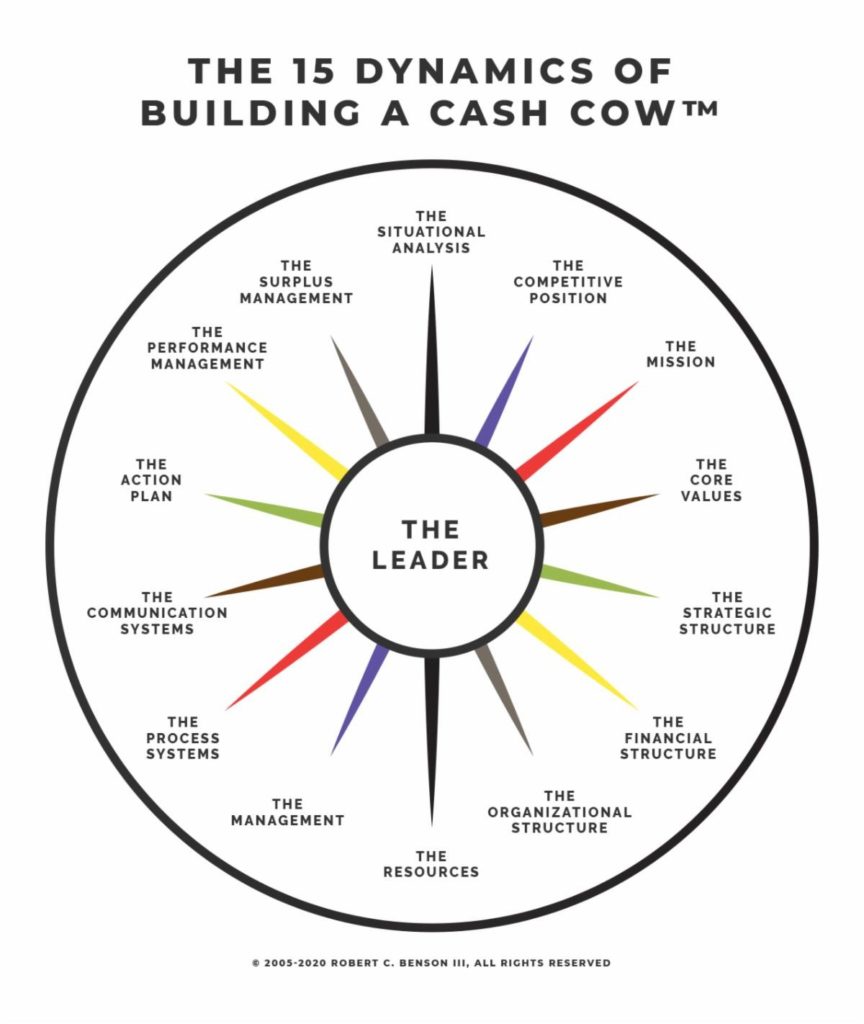The 15 Dynamics of Building a Cash Cow™ PART 1
The Leader
To help you in these strange times I am writing a series of articles on The 15 Dynamics of Building a Cash Cow™. Most of the articles, including this one, are applicable to both profit and non-profit companies.
“For as he thinks in his heart, so is he.” Proverbs 27:3a
Leaders have natural talents, gifts, and intelligence to run a company, provide jobs for people, and help them grow and develop. This enables them to build companies, take risks, and make difficult decisions. Like the people they hire, their abilities are also continuously growing and developing. Many books have been written on the power of what one believes and how that affects him/her. However, when that person is the leader of a company his/her beliefs affect the entire organization. Why? Because “A company is but a shadow of its leader.” (Ralph Waldo Emerson)
As we discussed in the INTRODUCTION, leaders are exposed to enormous amounts of data, including numerous books and articles on business, the internet, and input from many people. The key to keeping their leadership responsibility simpler and focus is to know and use the right principles, especially the driving principles of The 15 Dynamics of Building a Cash Cow™.

THE LEADER’S BELIEF SYSTEM
For leaders, the driving principle is that what he/she believes to be the truth (reality) will drive his/her emotions, decisions, and behavior. Those impact the culture, values, decisions, and behavior of the people in the entire company (his/her shadow)! And that results in impacting the profits, growth, cash-flow, and development of the company.
During one of the economic downturns, I received a call from a partner of a subcontractor who wanted me to meet with him and his partner. They had been in business for several years and were losing a lot of money. I asked them to email me three years of financial statements for the meeting. In our meeting, they told me they had cash-flow problems and didn’t know what to do. After talking with them for a while and exploring options and ideas, they told me that market conditions were such that “it is impossible for us to increase sales and we can’t raise prices.” They wanted me to help them decide how to cut costs.
We agreed on an engagement and I prepared a three-year analysis of their financial history, a projection of the current year’s operation along with a projected cash-flow, capital requirements, a pricing, cost, margin, and overhead assessment and balance sheet. The spreadsheet was interactive, so I prepared two options including cutting costs or increase sales and/or prices. Both plans led to a profit and allowed us to do “what if” projections in our meeting. After doing so, they continued to insist they couldn’t increase sales or prices. They walked out with their minds set on the option to cut costs. We set a meeting for the next month for a progress report.
“For God has not given us a spirit of fear, but of power and of love and of a sound mind.” 2 Timothy 1:7 NKJV
In our next meeting, they informed me that when they sat down to cut overhead expenses, they realized they were going to have to cut two key management personnel and one of the owner’s sons who was in sales. They decided that was not desirable and they set their minds on raising prices and got more creative and aggressive with sales. By the time we met again, they had already picked up new accounts. Within a couple of months, they were already breaking even and went on to become profitable.
It was their thinking/beliefs – perceptions of reality that it was impossible to increase sales or prices in the current economy – driven by fear, that was causing them to fail. When the leader’s emotions turned from fear to love for his son and concern for the needs of two key supervisors (love), he changed his thinking and set his mind on increasing sales and raising prices. And that changed his beliefs!
“A company is but a shadow of its leader” Ralph Waldo Emerson
Mary C. Lamia Ph.D. says, “like it or not, emotions will drive the decisions you make today.” The following are her explanations.
“Your emotions will drive the decisions you make today, and your success may depend upon your ability to understand and interpret them. When an emotion is triggered in your brain, your nervous system responds by creating feelings in your body (what many people refer to as a “gut feeling”) and certain thoughts in your mind. A lot of your decisions are informed by your emotional responses because that is what emotions are designed to do: to appraise and summarize an experience and inform your actions.
But if an emotion is triggered, how much should you pay attention to your visceral response and the thoughts it creates? Emotions are not particularly sophisticated or precise, but their speed and utility make up for what they lack in sophistication and precision. Emotions, when they are not disordered, provide information about your circumstances in a simple, quick way that does not involve a lot of cognition (thinking about it). So they attempt to tell you if a situation is optimal or not aligned with your goal, and how you might approach it.
We’re constantly faced with an abundance of information that we must process and a lot of stimulation to reflect upon. You do not have time to process all information in a reflective fashion but your brain processes it passively and unconsciously. If your brain comes across something it appraises as a “red flag,” you’ll be sent a general, vague alert in the form of the feelings and thoughts that are created by emotions. This somewhat imprecise signal alerts you to pay attention. In this way, your emotions serve as a cueing system or an attention-directing system associated with physiological changes that can prepare you to take action. Emotions are behind many complex dynamics in business and personal relationships…
Emotions have tremendous action potential…Your emotional system can give you an advantage in decision-making if you make proper use of it”
“Our view of reality is like a map with which to negotiate the terrain of life. If the map is true and accurate, we will generally know where we are, and if we have decided where we want to go, we will generally know how to get there.” M. Scott Peck, M.D, The Road Less Traveled
A STRONG DECISION-MAKING FOUNDATION
To properly interpret our emotions, one has to determine if they are based on truth (reality and facts). Since how you think (your beliefs) trigger your emotions it is critical that your beliefs are founded on reality. The key to developing good beliefs is defined by Max De Pree in his book “Leadership is an Art” when he says, “The first responsibility of a leader is to define reality. The last is to say thank you. In between the two, the leader must become a servant and a debtor. That sums up the progress of an artful leader.”
“The first responsibility of leadership is to define reality.” Max De Pree
Not everything we learned or experienced in life, buried in our subconscious mind, is based on truth or all the truth. According to profiles, I am an intuitive person and it has served me well. But there is a principle I developed years ago after making bad emotional decisions and it has served me well: “Never make a life-changing decision when you are emotional.” This principle forces me to prudently consider whether love and caring or fear and anger are driving my emotions.
LIFELONG LEARNING
As discussed in the INTRODUCTION to this series of articles, my objective is to help leaders define reality by focusing on key driving principles. Ask yourself, what is the driving principle that changed the direction of the company’s leader above? What helped the leader define reality?
“Men are anxious to improve their circumstances, but, if unwilling to improve themselves, they, therefore, remain bound.” James Allen, Author, As a Man Thinketh
“Why make the effort?” you may ask yourself. “My company is doing okay.” Learning and using these 15 dynamics is a developmental process that works with any size company. On average, companies in the top 25% make three times more profit than the average companies in their industry. As discussed in the INTRODUCTION, in all cases, where the owner(s) learned and applied the driving principles behind the 15 Dynamics, their business moved from an average (or below average) business to a top 25% business in their industry. That resulted in increasing cash-flow and profits anywhere from 300% to 1,900% (from $80K per year to $1.5M profit per year). And, their quality of life and ability to sleep at night increased significantly.
Once Max De Pree had defined reality, why did he advise leaders to “say thank you?” Max was a Christian leading a fortune 500 company. Although it was not the largest company, it was one of the most profitable. Who was Max saying “thank you” to? Undoubtedly, he was thankful to the people who helped him define reality and succeed throughout his life. But he knew where the wisdom, knowledge, and clarity of reality was coming from to help him put all the pieces, principles, and people together – the Architect (see Introduction) who helped create the universe. He was thanking Jesus Christ, who according to the Bible, is the leader over all of God’s creation. Ask Him for wisdom, knowledge, and understanding – if you are sincere, He will give it to you!
“My goal is that they may be encouraged in heart and united in love, so that they may have the full riches of complete understanding, in order that they may know the mystery of God, namely, Christ, in whom are hidden all the treasures of wisdom and knowledge… So then, just as you received Christ Jesus as LORD, continue to live your lives in him, rooted and built up in him, strengthened in the faith as you were taught, and overflowing with thankfulness. See to it that no one takes you captive through hollow and deceptive philosophy…” Colossians 2:2-8 NIV
Yes, it is true that “A company is but a shadow of its leader.” What you believe to be reality is reflected and integrated into the company in many ways through your behavior and decisions. Intimidating, I know. But look at the shadow a President of the U.S. has on this county, a Governor has on the state you live in, the leaders of the companies you have worked for had on those companies, and your parents had on your family.
“Just as a gardener cultivates his plot, keeping it free from weeds, and growing the flowers and fruits which he requires, so may a man tend the garden of his mind.” James Allen
EVERYTHING YOU NEED
If you are leading a small company (less than 100 employees) you may think these 15 Dynamics are for medium, big and large companies. Not true! They are for all leaders who want to build a thriving company for yourself, your family, humanity, your community, the poor, Christ’s work on earth, or any other value building or good works objective you have.
“Trust in the Lord with all your heart, And lean not on your own understanding; In all your ways acknowledge Him, And He shall direct your paths.” Proverbs 3:5-6 NKJV
God has created you for a purpose and has given you talents and gifts. As a leader, He has given you a leadership style for the special responsibility of helping to take care of the people and resources entrusted to you. There is no one correct leadership style and I will explain more about how to build a team around your leadership style in Part 8 on The Organization Structure.
“For You created my inmost being; You knit me together in my mother’s womb. I praise You because I am fearfully and wonderfully made; Your works are wonderful, I know that full well. My frame was not hidden from You when I was made in the secret place, when I was woven together in the depths of the earth. Your eyes saw my unformed body; all the days ordained for me were written in Your book before one of them came to be.” Psalm 139:13-16 NIV
People have habits formed from their belief system that, combined, make company habits. They create the behavior that goes on day after day, month after month, sometimes year after year, almost automatically. It’s like driving a car home at night when you are exhausted. After you arrive home you have a scary feeling of not remembering some or a lot of the drive home. That’s what is referred to as the Robot within you driving the vehicle. That’s what happens with the daily use of your beliefs at work. As you move forward, I recommend you set your mind on further defining reality and remember that old habits and incorrect, outdated, or incomplete belief systems die hard.
“I have a little Robot that goes around with me; I tell it what I’m thinking – I tell it what I see. I tell my little robot all my hopes and fears; It listens and remembers all my joys and tears. At first my little robot followed my command, But after many years of training, it’s gotten out of hand! It doesn’t care what’s right or wrong – or what is false or true. …No matter what I ‘try now, it tells me what to do.” Author Unknown
A VISION FOR THE FUTURE AND DRIVING PRINCIPLES
James Allen points out the “Good thoughts and actions can never produce bad results; bad thoughts and actions can never produce good results. A man should conceive of a legitimate purpose in his heart and set out to accomplish it. He should make this purpose the centralizing point of his thoughts. Dreams are the seedlings of realities.”
In each article, we will examine typical faulty or incomplete belief(s) that, if yours, can significantly limit your financial and growth potential. You may be wondering, “What kind of faulty or incomplete beliefs?” I encourage you to follow along with me as we examine them and the principle beliefs driving The 15 Dynamics of Building a Cash Cow.
Best wishes and stay safe!

If you have feedback or questions for Bob, topics you would like him to write about, or someone you would like added to our database, email bob@CCBAlliance.org. For information on The Colorado Christian Alliance go to WWW.CCBAlliance.org

